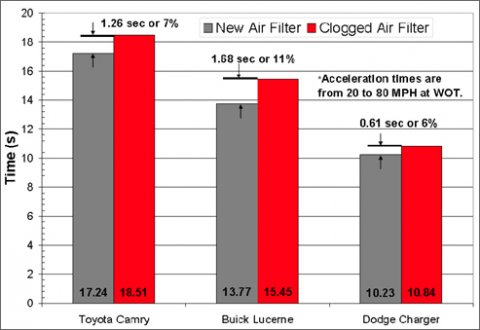A February 2009 study conducted by Oak Ridge National Laboratory found that for modern computer-controlled, fuel-injected engines, changing a clogged air filter has no measurable affect on fuel economy but does affect ultimate performance. Average acceleration times for the vehicles in the study improved by 6 to 11 percent when running on a clean filter. The fuel economy of carbureted engines, which went out of production in the early 1980s, was impacted by a dirty air filter. The study found that typical fuel economy gains for replacing the air filter on the carbureted vehicle were in the range of 2 to 6 percent.
Performance Benefit to Changing a Clogged Air Filter on a Modern Vehicle
Notes:
WOT – Wide-open throttle
MPH – Miles per hour
A clogged filter was defined by a level of airflow restriction that was sufficient to activate a common indicator light inside the vehicle showing the air filter needs changed. On all vehicles, the level of restriction was on the order of 6.0 to 7.0 kilopascals (kPa – pressure unit).
Supporting Information
Acceleration times 20 to 80 MPH at WOT* (Seconds)
| Difference | ||||
|---|---|---|---|---|
| Test Vehicle | New Air Filter | Clogged Air Filter | Seconds | Percent |
| 2003 Toyota Camry | 17.24 | 18.51 | 1.26 | 7% |
| 2007 Buick Lucerne | 13.77 | 15.45 | 1.68 | 11% |
| 2006 Dodge Charger | 10.23 | 10.84 | 0.61 | 6% |
* Wide-open throttle. | ||||


